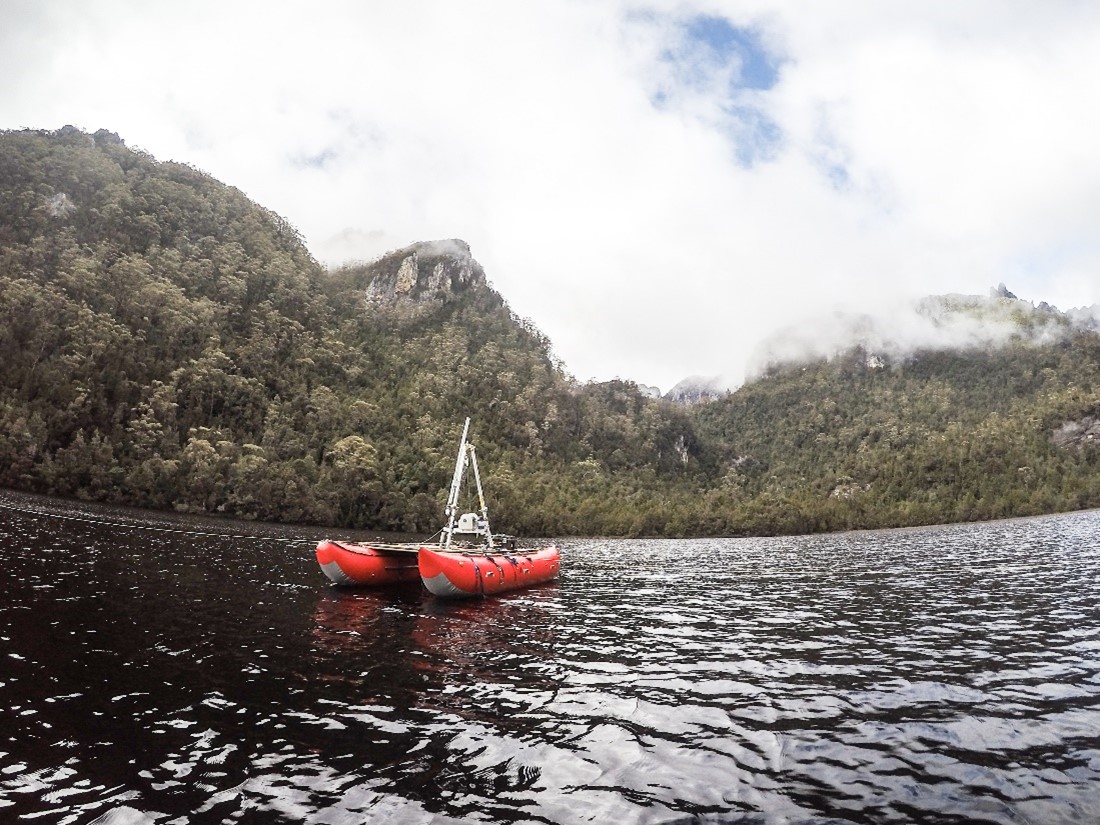Wednesday, 16 February 2022
British colonisation of Australia, together with the effects climate change, is likely to have contributed to the recent catastrophic wildfires in southeast Australia, a new study has found.
An international team of researchers, led by the University of Nottingham, have examined the land cover changes that occurred after the British settlement in southeast Australia, which started in 1788.
By extracting tiny fossilised grains of pollen that are laid down in layers of ancient sediment in wetlands and lakebeds, the scientists were able to develop a picture of vegetation in the past.
 Platform used to extract lake sediments containing fossil pollen grains in Tasmania, Australia © Michela Mariani
Platform used to extract lake sediments containing fossil pollen grains in Tasmania, Australia © Michela Mariani
In a world first, they used pollen modelling techniques to find out what the vegetation was like at 52 different sites before and after 1788. The experts discovered evidence of denser vegetation in forests and woodlands following colonial settlement.
They found that forests in the southeast are now much denser than they were before 1788 and have become more flammable due to the amount of woody biomass there. The researchers found an increase of shrub cover by as much as 48%, with an overall average increase of 12% - which the researchers say, considering the vast area covered by the study, the “increase in biomass is massive”.
In the study, published in the academic journal Frontiers in Ecology and the Environment, the scientists say the increase in ‘shrubbiness’ is linked to Indigenous burning practices ceasing.
We know from historical reports that much of the landscape in early colonial southeast Australia was similar to an open savanna with grassy areas and large gaps between trees. This was described by an early English explorer as ‘a gentleman’s park’, very much reminding him of England.

Painting by Robert Hoddle, Ginninginderry Plains, New South Wales, Australia (1832), depicting the "open savanna" that Indigenous people maintained
The Indigenous people carefully managed this through lighting small fires to prevent flammable vegetation growing back and maintaining this largely open vegetation. After colonial settlement, fire management practices have become more oriented towards fire suppression, disrupting millennia of Indigenous cultural burning.
Dr Mariani explained: “Today, the increase in shrubs provides a connection from the ground to the forest canopy which allows fire to spread with ease, and this has led to the unprecedented fires we have seen in recent years. For example, the Black Summer bushfires (2019-2020) cost the Australian economy over $100 billion (AUD) and burnt a total of 18 million hectares - an area almost twice the size of England. During this event, about 20 per cent of Australian native eucalypt forests burnt down. This proportion of forest burnt is considerably high in comparison what has happened in the past few decades.
Climate change is undoubtedly having an impact on the intensity and scale of these bushfires, but forest management plays a big role too. Our research offers supporting evidence for implementing fire management practices more aligned to Indigenous cultural burning, in order to better manage forests and in turn help to manage fire behaviour in the future.
The academics suggest that the Australian fire management agencies should seek to work with Indigenous people to implement new approaches to minimise the accumulation of flammable biomass and limit future risk of extreme wildfires.
High-speed video showing researchers extracting lake sediments using a platform. © Michael-Shawn Fletcher
Drone footage taken by the researchers shows damage a few months after fire within forests that burnt during the 2019-2020 bushfires. © Michael-Shawn Fletcher
Story credits
More information is available from Dr Michela Mariani, in the Faculty of Social Sciences at the University of Nottingham at Michela.Mariani@nottingham.ac.uk
Notes to editors:
About the University of Nottingham
Ranked 97 in the world and 17th in the UK by the QS World University Rankings, the University of Nottingham is a founding member of Russell Group of research-intensive universities. Studying at the University of Nottingham is a life-changing experience, and we pride ourselves on unlocking the potential of our students. We have a pioneering spirit, expressed in the vision of our founder Sir Jesse Boot, which has seen us lead the way in establishing campuses in China and Malaysia - part of a globally connected network of education, research and industrial engagement.
Nottingham was crowned Sports University of the Year by The Times and Sunday Times Good University Guide 2024 – the third time it has been given the honour since 2018 – and by the Daily Mail University Guide 2024.
The university is among the best universities in the UK for the strength of our research, positioned seventh for research power in the UK according to REF 2021. The birthplace of discoveries such as MRI and ibuprofen, our innovations transform lives and tackle global problems such as sustainable food supplies, ending modern slavery, developing greener transport, and reducing reliance on fossil fuels.
The university is a major employer and industry partner - locally and globally - and our graduates are the third most targeted by the UK's top employers, according to The Graduate Market in 2024 report by High Fliers Research.
We lead the Universities for Nottingham initiative, in partnership with Nottingham Trent University, a pioneering collaboration between the city’s two world-class institutions to improve levels of prosperity, opportunity, sustainability, health and wellbeing for residents in the city and region we are proud to call home.
More news…